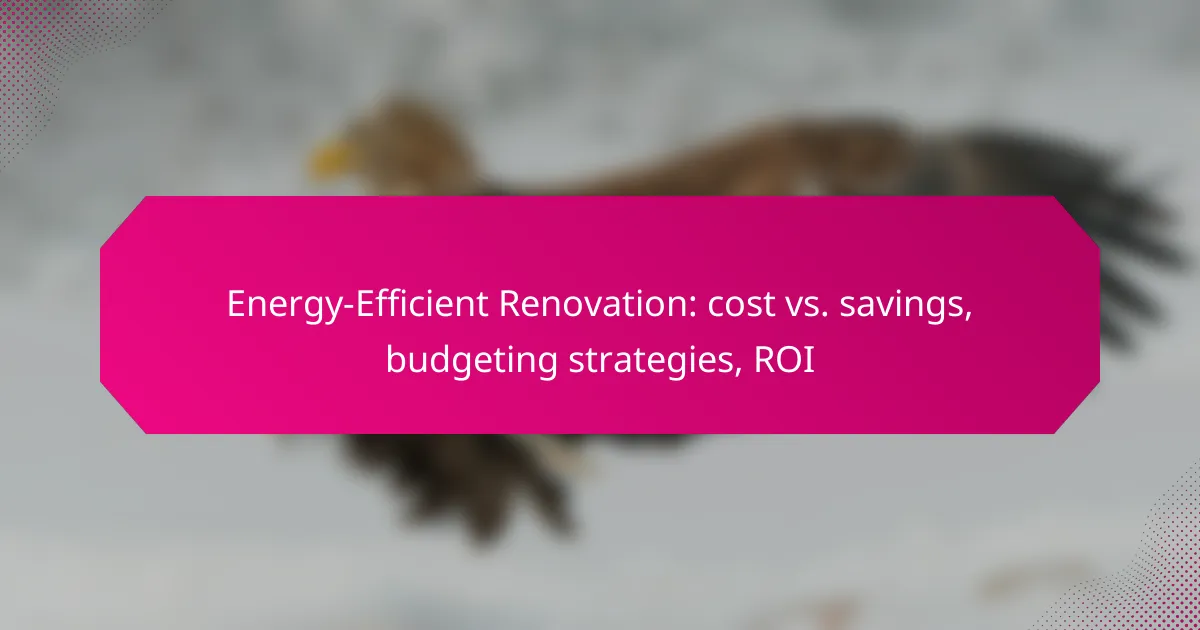Energy-efficient renovations present a valuable opportunity for homeowners to reduce energy costs while enhancing property value. By strategically budgeting and prioritizing impactful upgrades, homeowners can maximize savings and take advantage of potential government incentives. The return on investment for these renovations often ranges from 10% to 30%, highlighting their financial viability over time.
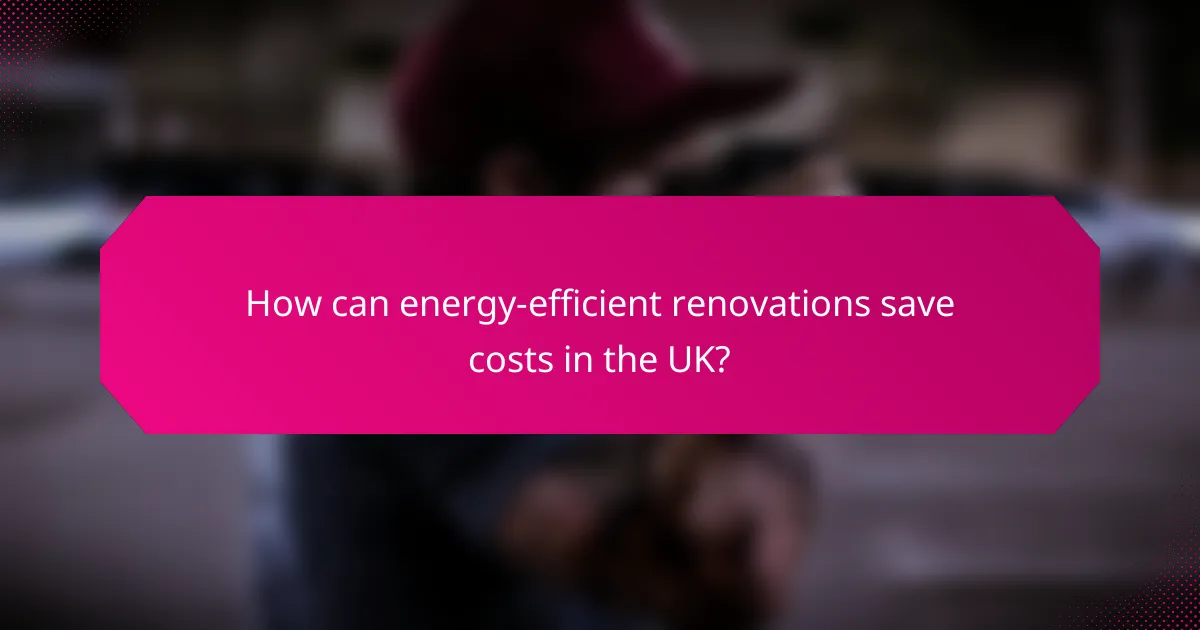
How can energy-efficient renovations save costs in the UK?
Energy-efficient renovations can significantly reduce costs for homeowners in the UK by lowering energy bills, increasing property value, and taking advantage of government incentives. These renovations often lead to long-term savings that outweigh the initial investment, making them a financially sound choice.
Lower energy bills
One of the most immediate benefits of energy-efficient renovations is the reduction in energy bills. Upgrading insulation, installing energy-efficient windows, and using smart thermostats can lead to savings of 20-30% on heating and cooling costs. Over time, these savings can accumulate to a substantial amount, often covering the cost of renovations within a few years.
Homeowners should consider conducting an energy audit to identify the most effective upgrades for their property. Simple measures, such as sealing drafts and improving insulation, can yield quick returns on investment.
Increased property value
Energy-efficient renovations can enhance the market value of a home. Properties with energy-efficient features often attract buyers willing to pay a premium, as they offer lower ongoing costs. Studies suggest that homes with energy-efficient ratings can sell for 5-10% more than similar homes without these features.
Investing in energy-efficient upgrades can make a property more appealing in a competitive market. Features like solar panels, energy-efficient appliances, and high-quality insulation can set a home apart and justify higher asking prices.
Government incentives
The UK government offers various incentives to encourage energy-efficient renovations, including grants and tax reliefs. Programs like the Energy Company Obligation (ECO) and the Green Homes Grant can help offset renovation costs, making energy upgrades more accessible for homeowners.
Homeowners should research available incentives and ensure they meet eligibility criteria. Taking advantage of these programs can significantly reduce upfront costs and improve the overall return on investment for energy-efficient renovations.
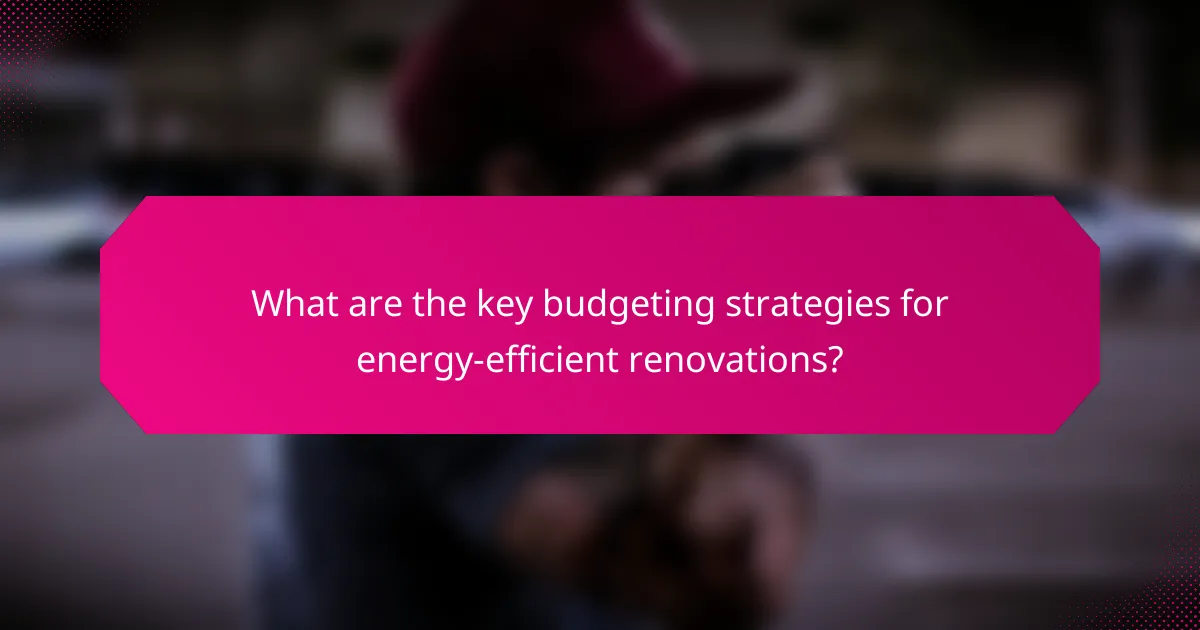
What are the key budgeting strategies for energy-efficient renovations?
Effective budgeting strategies for energy-efficient renovations focus on maximizing savings while minimizing upfront costs. By prioritizing impactful upgrades, utilizing financing options, and setting a realistic budget, homeowners can achieve significant energy savings over time.
Prioritize high-impact upgrades
Identifying high-impact upgrades is crucial for maximizing the benefits of energy-efficient renovations. Focus on improvements that offer the best return on investment, such as upgrading insulation, installing energy-efficient windows, or replacing outdated heating and cooling systems.
Consider conducting an energy audit to pinpoint areas where energy loss occurs. This can help prioritize which upgrades will yield the most significant savings, often leading to reductions in energy bills by 20-30% or more.
Utilize financing options
Financing options can ease the burden of upfront costs associated with energy-efficient renovations. Look for government programs, grants, or low-interest loans that support energy efficiency improvements, which may be available in your region.
Many utility companies also offer rebates for specific upgrades, such as energy-efficient appliances or solar panels. Research these opportunities to offset costs and improve your overall budget for renovations.
Set a realistic budget
Setting a realistic budget involves estimating costs accurately and accounting for potential unexpected expenses. Start by gathering quotes from contractors and suppliers to understand the financial scope of your planned renovations.
Include a contingency fund of about 10-15% of the total budget to cover unforeseen costs. This approach helps ensure that your renovation stays on track without financial strain.
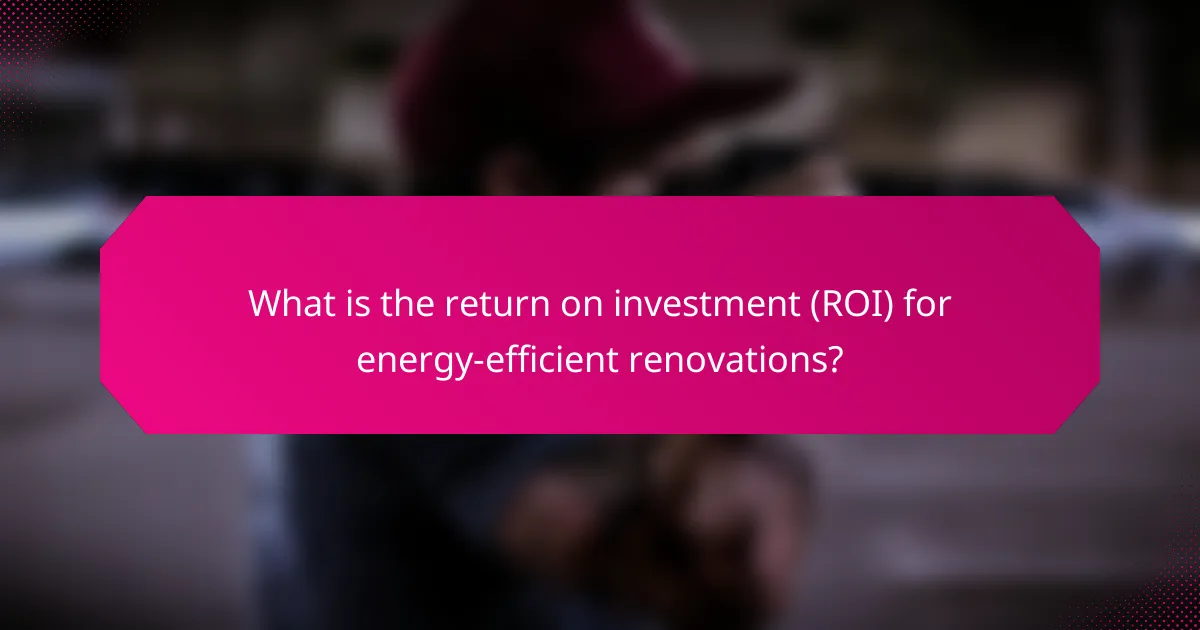
What is the return on investment (ROI) for energy-efficient renovations?
The return on investment (ROI) for energy-efficient renovations can vary significantly, typically ranging from 10% to 30%. This measure reflects the financial benefits gained from energy savings compared to the initial costs of the renovations.
Average ROI percentages
On average, homeowners can expect an ROI of around 15% to 20% for energy-efficient upgrades, such as insulation, energy-efficient windows, and HVAC systems. Some improvements, like solar panels, may yield even higher returns, potentially exceeding 30% depending on local incentives and energy costs.
It’s essential to consider that ROI can fluctuate based on market conditions and the specific features of the renovation. For instance, energy-efficient appliances often provide a lower ROI compared to larger structural changes.
Factors influencing ROI
Several factors can influence the ROI of energy-efficient renovations, including the type of improvement, local energy prices, and available incentives. For example, regions with higher electricity costs may see a quicker payback period for solar installations compared to areas with lower rates.
The quality of the installation also plays a crucial role; poorly executed renovations can diminish expected savings and, consequently, ROI. Homeowners should prioritize hiring qualified professionals to ensure effective upgrades.
Case studies in the UK
In the UK, a study revealed that homeowners who invested in solid wall insulation saw an average ROI of about 20% over five years. This improvement not only reduced energy bills but also increased property value.
Another case involved a homeowner who installed energy-efficient windows, resulting in a 15% increase in home value and significant savings on heating costs. Such examples highlight the potential benefits of energy-efficient renovations in the UK housing market.
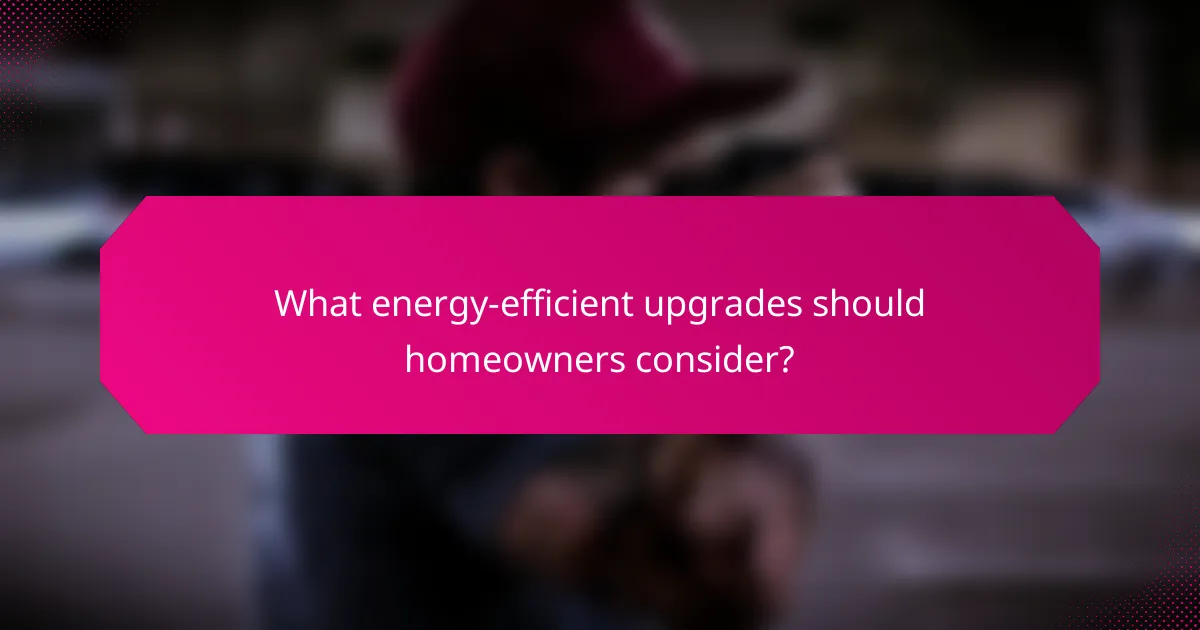
What energy-efficient upgrades should homeowners consider?
Homeowners should consider upgrades such as improved insulation, energy-efficient windows, and smart thermostats to enhance energy efficiency. These upgrades can significantly reduce energy consumption and lead to long-term savings on utility bills.
Insulation improvements
Insulation improvements are crucial for maintaining a comfortable indoor temperature and reducing energy costs. Upgrading insulation in attics, walls, and basements can prevent heat loss in winter and keep homes cooler in summer.
When considering insulation, look for materials with high R-values, which indicate better thermal resistance. Common options include fiberglass, foam, and cellulose. Homeowners can expect to see a return on investment (ROI) of around 70-90% for insulation upgrades.
Energy-efficient windows
Energy-efficient windows help minimize heat transfer, improving comfort and reducing energy bills. These windows typically feature double or triple glazing, low-emissivity (Low-E) coatings, and gas fills to enhance insulation.
When selecting windows, consider the U-factor and Solar Heat Gain Coefficient (SHGC) ratings, which indicate energy performance. While the initial investment may be higher, homeowners can save significantly on heating and cooling costs, often recouping their investment within a decade.
Smart thermostats
Smart thermostats allow homeowners to optimize their heating and cooling systems for maximum efficiency. These devices can learn user preferences, adjust temperatures automatically, and be controlled remotely via smartphone apps.
Installing a smart thermostat can lead to energy savings of 10-15% on heating and cooling bills. Look for models that are compatible with existing HVAC systems and offer features like scheduling and energy usage reports to maximize savings.
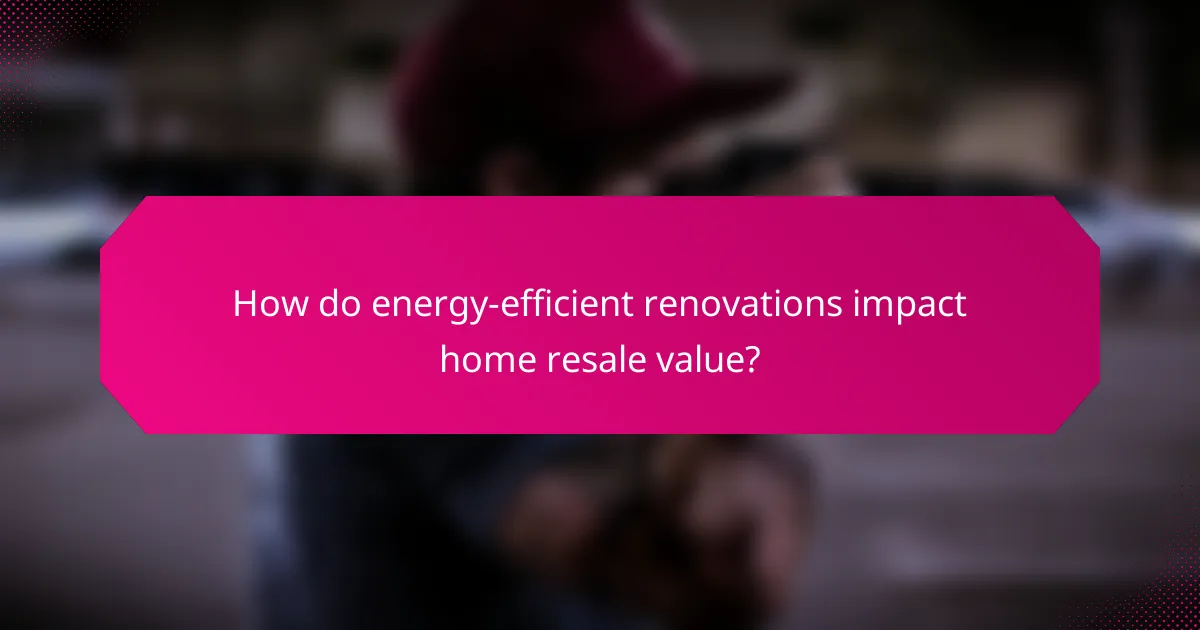
How do energy-efficient renovations impact home resale value?
Energy-efficient renovations can significantly enhance a home’s resale value by making it more attractive to potential buyers. Homes with energy-efficient features often command higher prices due to lower utility costs and increased comfort, appealing to environmentally conscious consumers.
Market trends in the UK
In the UK, the demand for energy-efficient homes has been on the rise, driven by increasing energy costs and a growing awareness of climate change. Recent studies indicate that properties with energy-efficient ratings, such as those with an Energy Performance Certificate (EPC) rating of A or B, tend to sell faster and at higher prices compared to lower-rated homes.
As of 2023, buyers are increasingly prioritizing energy efficiency, with many willing to pay a premium for homes that offer sustainable features. This trend is expected to continue as government policies increasingly favor energy-efficient housing developments.
Buyer preferences
Today’s homebuyers often prioritize energy efficiency as a key factor in their purchasing decisions. Features like double glazing, insulation, and energy-efficient heating systems are highly sought after, as they promise lower energy bills and a reduced carbon footprint.
Additionally, buyers are becoming more educated about the long-term savings associated with energy-efficient renovations, making them more inclined to invest in homes that offer these benefits. This shift in preference is reshaping the real estate market, with energy-efficient homes standing out in listings.
Comparative analysis of renovated vs. non-renovated homes
When comparing renovated homes with energy-efficient upgrades to non-renovated properties, the differences in resale value can be substantial. Homes that have undergone energy-efficient renovations can see an increase in value ranging from 5% to 15%, depending on the extent of the improvements and local market conditions.
For instance, a home with upgraded insulation, energy-efficient windows, and modern heating systems may attract buyers more readily than a similar home without these features. This comparative advantage not only enhances resale potential but also contributes to quicker sales, making energy-efficient renovations a wise investment for homeowners looking to maximize their property’s value.
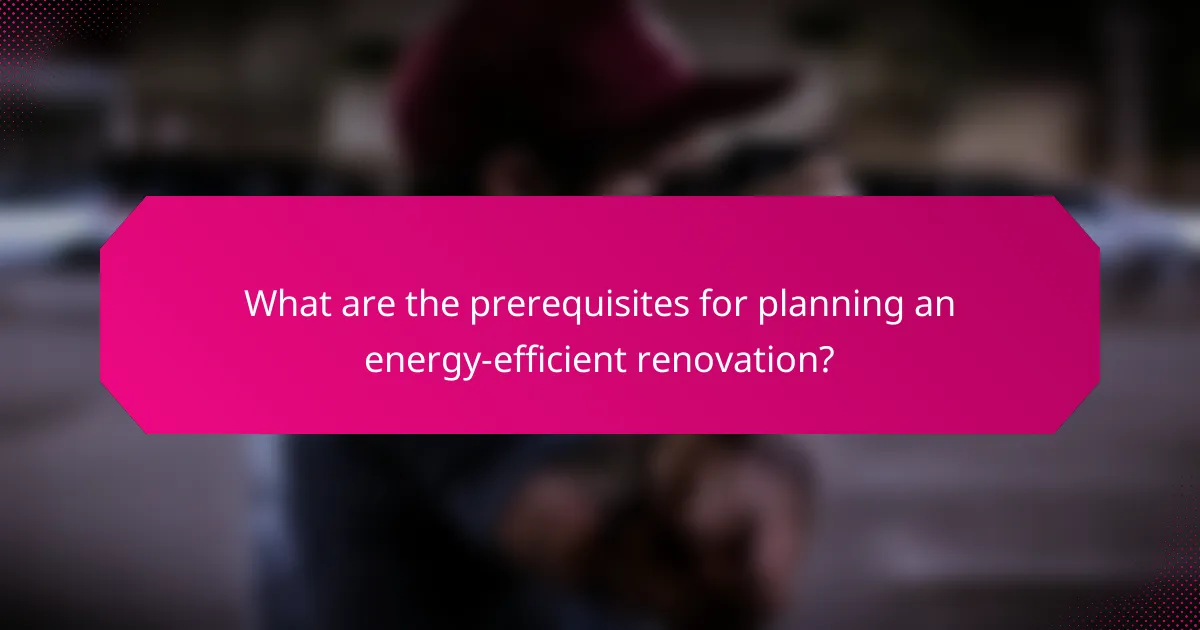
What are the prerequisites for planning an energy-efficient renovation?
Planning an energy-efficient renovation requires a clear understanding of your current energy usage and compliance with local regulations. Identifying areas for improvement and understanding the financial implications will help you make informed decisions.
Energy audits
An energy audit is a comprehensive assessment of your home’s energy use, identifying inefficiencies and potential upgrades. This process typically includes evaluating insulation, heating and cooling systems, and appliances.
Homeowners can expect to pay a few hundred dollars for a professional energy audit, but the insights gained can lead to savings that significantly outweigh the initial cost. Many utility companies offer free or discounted audits, so check with your local provider.
Local building regulations
Before starting any renovation, it’s crucial to understand local building regulations that may affect your energy-efficient upgrades. These regulations often dictate minimum energy performance standards and may require permits for specific improvements.
Familiarize yourself with local codes, which can vary significantly by region. For instance, some areas may have incentives for using renewable energy sources, while others may impose restrictions on certain materials. Consulting with a local contractor or building authority can ensure compliance and help avoid costly fines.
